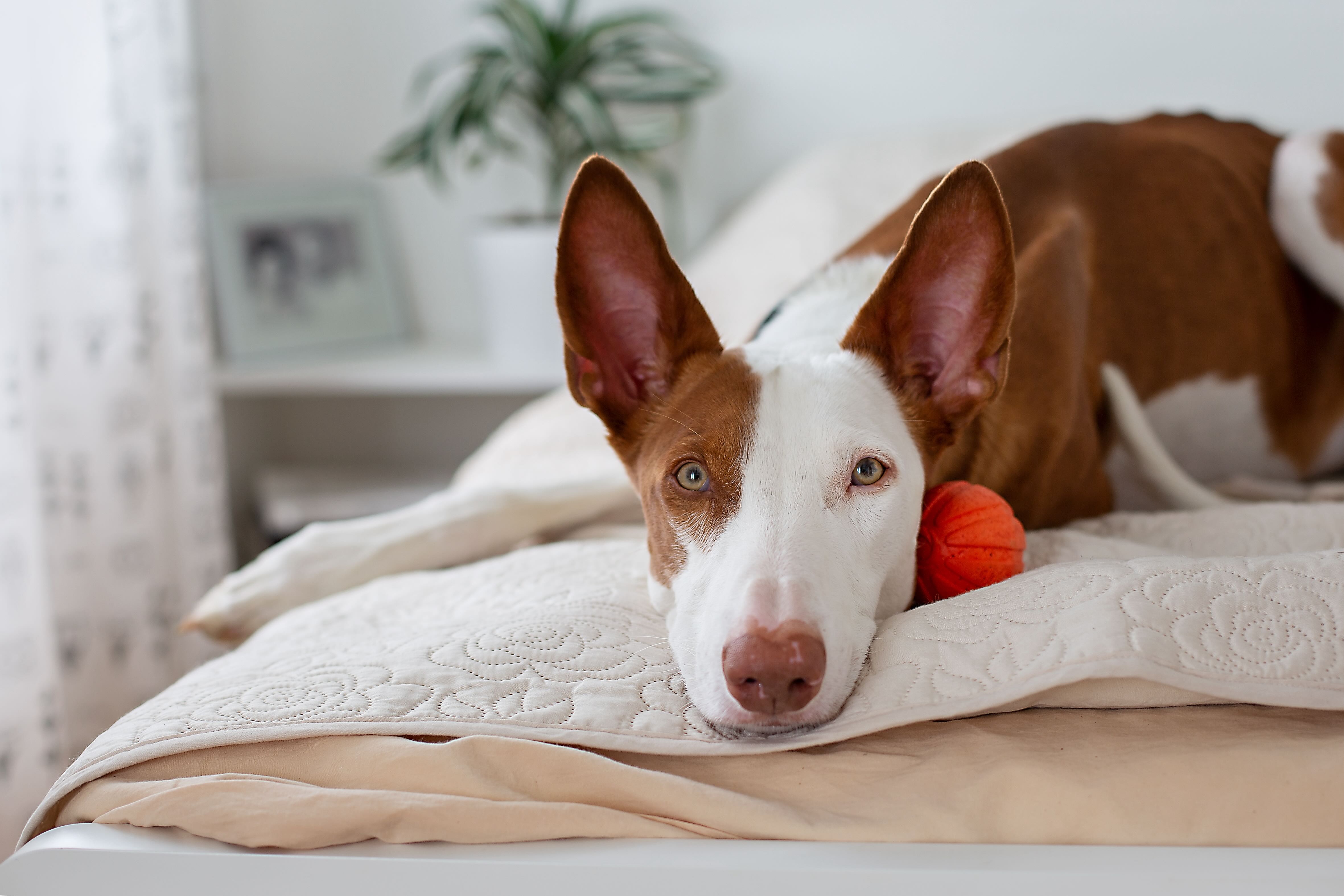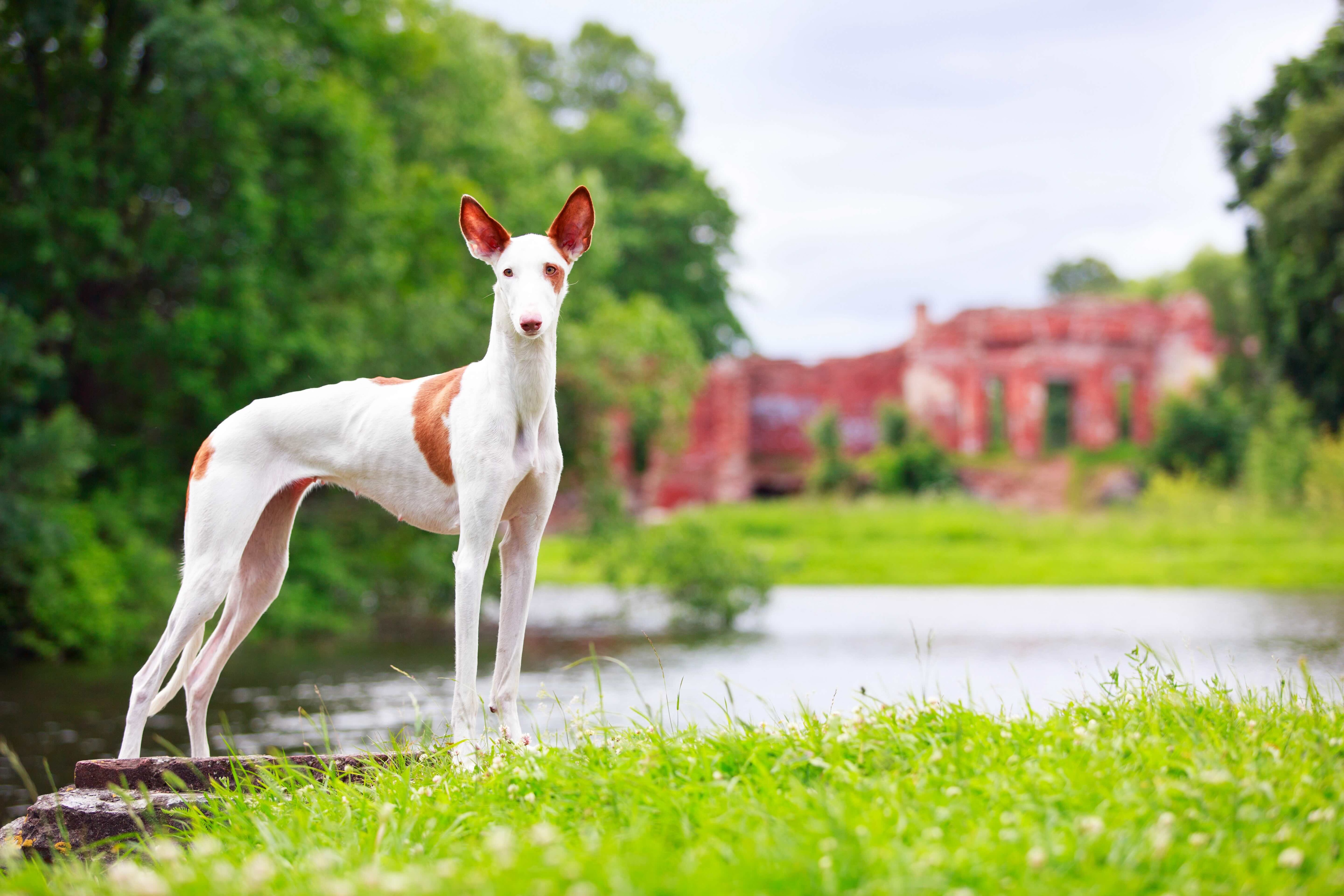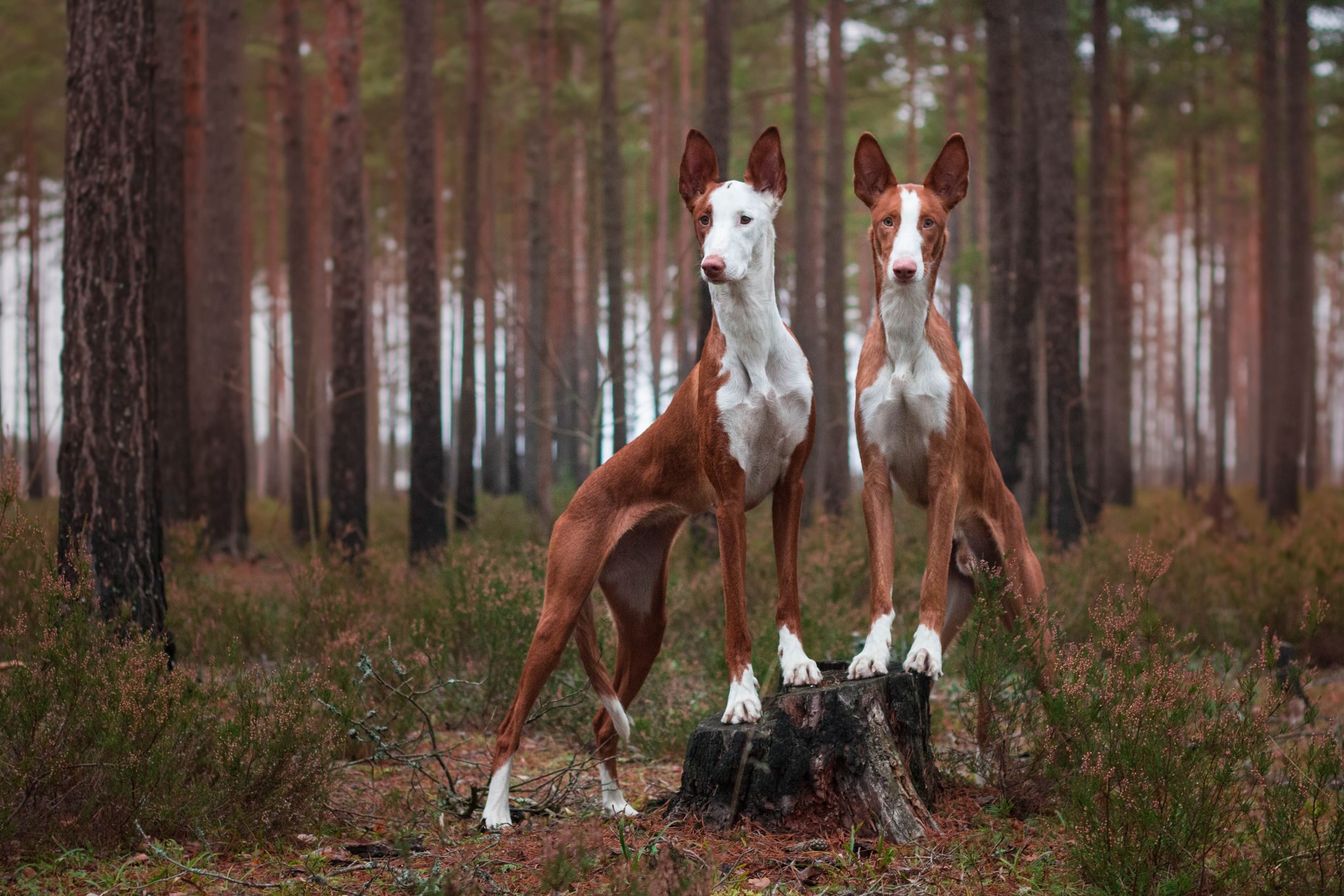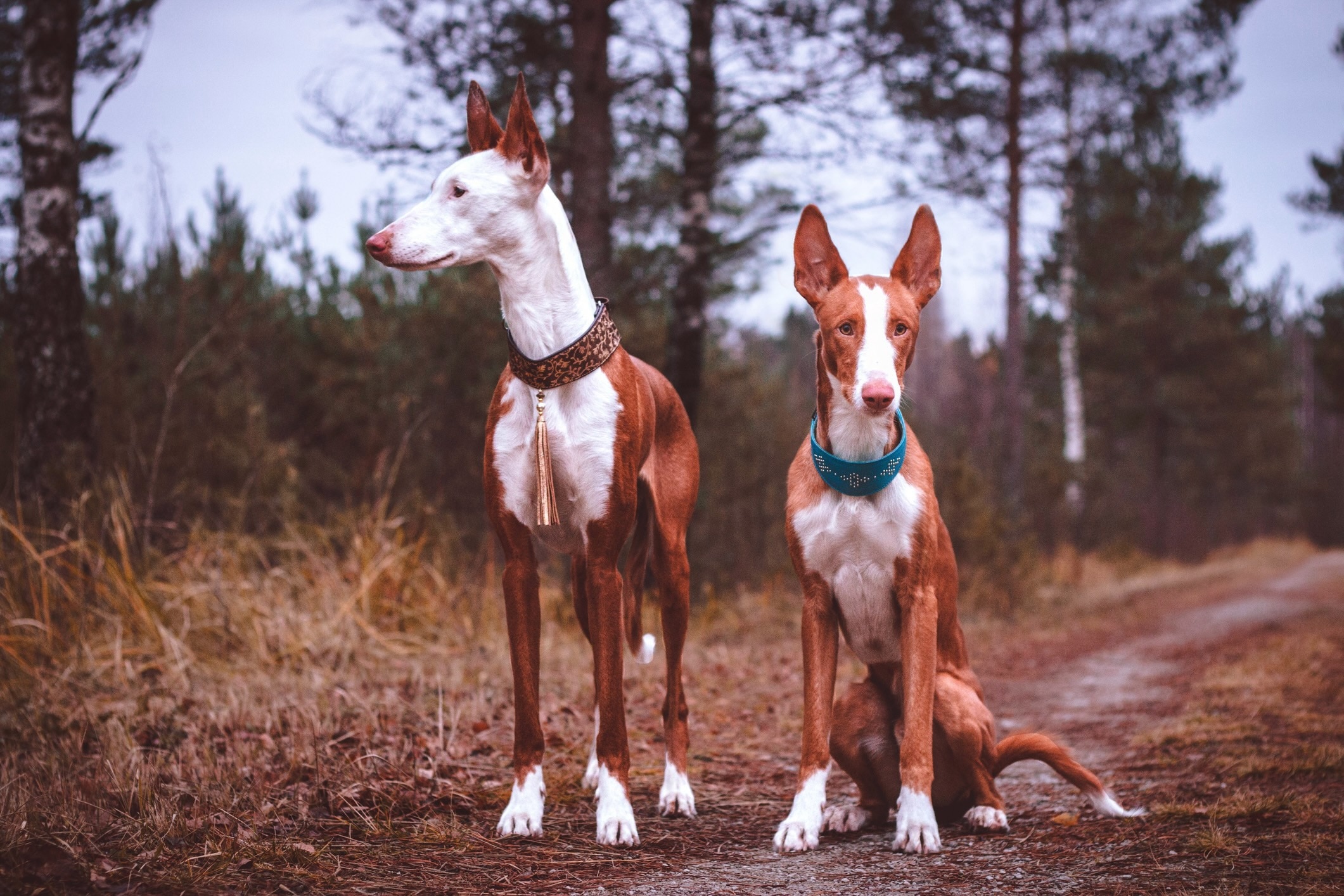Ibizan Hound
Kristiinatammik/iStock / Getty Images Plus via Getty Images
Though the Ibizan Hound has an ancient history, these athletic and elegant hounds are relatively rare. The breed as we know it today has origins in the Balearic islands—with one of the primary islands, Ibiza, inspiring the hound’s namesake.
However, ancient Egyptian art depicts slender hunting dogs with features similar to the Ibizan. This likely means that traders brought these early dogs to the islands, where the breed excelled as a rabbit hunting companion. Their slight build and long legs made Ibizan Hounds adept at traversing the hilly terrain in search of small game.
A full-grown Ibizan Hound stands 23–27 inches tall at the shoulder and weighs 45–50 pounds. According to the Ibizan Hound Club of the United States (IHCUS), these dogs have a muscular, fine-boned body structure. The short coat is red, white, or a combination of the two, and can be smooth or wiry.
Caring for an Ibizan Hound
Ibizan Hounds have a balanced temperament that can make them excellent companions—as long as you can give them enough physical and mental exercise. These dogs have a moderate to high need for exercise to avoid boredom and unwanted behaviors, so plan on about two hours of energy-burning activity each day. With long legs and plenty of stamina, the Ibizan hound makes a great jogging partner.
The Ibizan Hound can be somewhat reserved around strangers but blossoms in the company of their close human companions. The breed is also known for having a playful streak.
Ibizan Hound Health Issues

Ibizan Hounds are generally considered to be a robust breed, with relatively few health problems and an average lifespan of 11–14 years. But as with all dog breeds, there are several conditions an Ibizan can develop.
The breed club recommends breeders comply with four screening tests available through the Canine Health Information Center (CHIC) to confirm the health of the dogs’ joints, thyroid, eyes, and ears.
Hypothyroidism
Hypothyroidism in dogs refers to lower-than-normal activity of the thyroid glands. This results in lower hormone levels, which may cause weight gain, lethargy, and changes in a dog’s coat, among other effects.
The breed club recommends routine thyroid lab testing after an Ibizan Hound is at least 2 years old. There’s no cure for hypothyroidism, but it can be managed with medication. Affected Ibizan Hounds can live long and happy lives with proper treatment.
Congenital Deafness
Ibizan Hound puppies that are born deaf may have inherited a gene that affects proper development of the inner ear.
Because congenital deafness is passed from the parent to the puppy, responsible breeders will test breeding stock for proper hearing. In addition, the breed club recommends that Ibizan hound puppies receive a BAER test to certify hearing ability.
Hip Dysplasia
Although it’s most prevalent in large breed dogs, any dog—including the medium-size Ibizan Hound—can be afflicted by hip dysplasia. This condition causes a loose hip joint that leads to excessive wear of the hip bone and cartilage, resulting in pain and limited mobility.
Hip dysplasia is a hereditary condition, but it can be managed through medication or surgery. Your veterinarian might also recommend giving your Ibizan Hound supplements to support joint health.
Eye Conditions
Like many purebred dogs, the Ibizan Hound is at risk for certain genetic eye diseases, including:
The breed club recommends that Ibizan Hounds undergo a screening examination (OFA Eye Certification) performed by a board-certified veterinary ophthalmologist every year to identify any inherited eye conditions as early as possible.
What To Feed an Ibizan Hound

An Ibizan Hound should be fed nutritionally well-balanced dog food. To narrow your search, choose a dog food approved by the Association of American Feed Control Officials (AAFCO), and work with your veterinarian to select a diet formulated for your dog’s life stage (puppy, adult, or senior).
How To Feed an Ibizan Hound
Like most adult dogs, a full-grown Ibizan Hound will do best when fed two meals a day, with regular feeding times in the morning and evening. However, Ibizan Hound puppies can be fed smaller meals more often throughout the day to support an increased need for nutrition and energy as they grow.
How Much Should You Feed an Ibizan Hound?
It’s important to not overfeed or underfeed your Ibizan Hound dog. Too much food can lead to obesity, and too little food can cause nutritional deficiencies. Consult your veterinarian for specific portion guidance based on your dog’s age, activity level, and overall health.
Nutritional Tips for Ibizan Hounds
Because hip dysplasia can be a concern for Ibizan hounds, you might support your dog’s diet with a joint health supplement. The most common ingredients to look for include omega fatty acids, glucosamine, methylsulfonylmethane (MSM), and chondroitin.
Consult your veterinarian for suggestions specific to your dog’s age and health, and never give your dog a supplement without your vet’s guidance.
Behavior and Training Tips for Ibizan Hounds
Ibizan Hound Personality and Temperament

Ibizan Hounds are eager to please their people, but they are also historically known to be independent thinkers. Forming a strong bond is essential, and they may be more reserved around new people.
With early socialization, the Ibizan Hound is a steady companion around children and other pets. The breed’s aptitude for play means it will eagerly engage with active children and other dogs.
Ibizan Hound Behavior
The Ibizan Hound learns quickly and wants to please their pet parent. But in the absence of appropriate training, the Ibizan Hound can become strong-willed and resistant to following training cues.
In addition, without sufficient exercise, this energetic breed can become anxious and might manifest undesirable traits—such as barking excessively or destructive behavior.
Ibizan Hounds also retain a strong prey drive because of their history as hunters. This means they might see smaller animals such as cats, pocket pets, and neighborhood squirrels as something to chase after. It’s important to keep your dog on a leash or inside a tall fence for their safety.
Make sure your fence is at least 6 feet tall, as the breed club says Ibizan Hounds are accomplished jumpers.
Ibizan Hound Training
The Ibizan’s intelligent and sensitive nature means you’ll need to provide consistent training, using positive reinforcement methods. Never resort to using force when training—this will only erode trust. Reward-based training is more effective at motivating an Ibizan Hound to learn your request and comply with it.
An Ibizan Hound dog shouldn’t be left alone for extended periods or they may develop separation anxiety. Crate training your puppy and giving them an interactive toy when you’re gone might help reduce separation anxiety.
All young dogs, including Ibizan Hound puppies, must be properly socialized from an early age to be comfortable in new situations. Talk to your veterinarian for socialization tips. When done correctly and consistently, Ibizans can grow confident when meeting new people, and learn that cats and other animals aren’t something to chase.
Fun Activities for Ibizan Hounds
-
Tracking
-
Running
Ibizan Hound Grooming Guide

The short coat of the Ibizan Hound translates into a simple, low-maintenance grooming routine. A weekly brushing and occasional bath are enough to keep the dog’s coat and skin healthy and looking its best.
Skin Care
The Ibizan Hound has no particular skin care requirements. Plan to bathe your dog as needed to eliminate odor or if your dog becomes overly dirty.
Coat Care
The Ibizan Hound’s short coat eliminates worries over tangling and matting, but you should still brush your dog weekly. Doing so will distribute natural oils to maintain a healthy sheen, and also remove loose hair that would otherwise wind up on your furniture, floors, and clothes.
Eye Care
Ibizan Hounds have no special eye care requirements, but regularly inspect their eyes and be alert for changes. Any notable redness, discharge, or cloudiness could be an indicator of a developing problem, so contact your vet right away if these symptoms are present.
Ear Care
The erect, pointy ears of the Ibizan Hound are one of the breed’s most distinguishing features. No special care is required, but pet parents should periodically check the inside of the ear for signs of an infection.
Talk to your vet about how often to clean your dog’s ears and which ear cleaning products they recommend.
Considerations for Pet Parents
The Ibizan Hound’s elegance makes them an appealing choice for a medium-sized dog breed. But these dogs aren’t a fit for every household.
These dogs were bred to work in close cooperation with a human handler and in the company of other dogs, so Ibizan Hounds don’t prefer a solitary life. If your dog will frequently be alone for extended periods, then an Ibizan Hound may not be an ideal fit.
But the Ibizan Hound is a good match for active individuals or families who want a moderate- to high-energy dog. The breed is agile, active, and will enjoy outdoor activities including hiking and running.
As a sight hound, the Ibizan Hound should never be off leash in an unfenced area. And even a fence might not be enough to contain an Ibizan Hound: This breed is known to have an impressive leaping ability, so a 6-foot fence (at a minimum) is recommended.
Ibizan Hound FAQs
Do Ibizan Hounds make good pets?
With consistent training, proper socialization, and sufficient exercise, the Ibizan Hound makes a good pet for families or single people. These dogs are known for being affectionate and entertaining companions.
How rare is the Ibizan Hound?
The Ibizan Hound is a rare breed, especially in the U.S. Although the breed received American Kennel Club (AKC) recognition in 1978, they’re not a common sight at the dog park. In 2023, the breed ranked 166th out of the 200 most popular dog breeds.
Do Ibizan Hounds bark a lot?
While the breed is not prone to barking excessively, this largely depends on the individual dog’s personality and training. Some Ibizan Hound dogs will vocalize more than others; you can discourage unwanted barking with consistent training.
Can Ibizan Hounds be left alone?
A well-trained Ibizan Hound that receives plenty of exercise and mental stimulation can be left alone on occasion for short periods. In general, though, these dogs much prefer the company of their human family or at least another dog. An Ibizan Hound that is routinely left alone is likely to be unhappy and act out with destructive behavior.
What’s the difference between an Ibizan Hound and a Pharaoh Hound?
The Ibizan Hound and Pharaoh Hound are two sight-hound breeds that share a similar slender body structure. However, the most notable difference between an Ibizan Hound and a Pharaoh Hound is the coat.
Ibizan Hounds might have a red coat with substantial white markings, while any white markings on the Pharaoh Hound will be limited to trace markings on the feet, tail, chest, neck, or head. In addition, the Pharaoh Hound’s coat is always smooth and sleek, while the Ibizan Hound can have a wiry coat.
